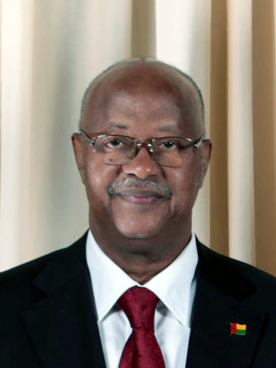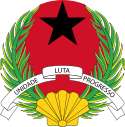
Guinea-Bissau, officially the Republic of Guinea-Bissau, is a country in West Africa that covers 36,125 square kilometres (13,948 sq mi) with an estimated population of 2,026,778. It borders Senegal to its north and Guinea to its southeast.

The politics of Guinea-Bissau take place in a framework of a semi-presidential representative democratic republic, with a multi-party system, wherein the President is head of state and the Prime Minister is head of government. Executive power is exercised by the government. Legislative power is vested in both the government and the National People's Assembly.

Kumba Ialá Embaló, also spelled Yalá, was a Bissau-Guinean politician who was president from 17 February 2000 until he was deposed in a bloodless military coup on 14 September 2003. He belonged to the Balanta ethnic group and was President of the Social Renewal Party (PRS). In 2008 he converted to Islam and took the name Mohamed Ialá Embaló. He was the founder of the Party for Social Renewal. In 2014, Ialá died from a cardiopulmonary arrest.

Carlos Domingos Gomes Júnior is a Bissau-Guinean politician who was Prime Minister of Guinea-Bissau from 10 May 2004 to 2 November 2005, and again from 25 December 2008 to 10 February 2012. He has been the President of the African Party for the Independence of Guinea and Cape Verde (PAIGC) since 2002 and is widely known as "Cadogo". He resigned as prime minister on 10 February 2012 to run in the presidential election triggered by President Malam Bacai Sanhá's death on 9 January.
Dissolution of a legislative assembly is the simultaneous termination of service of all of its members, in anticipation that a successive legislative assembly will reconvene later with possibly different members. In a democracy, the new assembly is chosen by a general election. Dissolution is distinct on the one hand from abolition of the assembly, and on the other hand from its adjournment or prorogation, or the ending of a legislative session, any of which begins a period of inactivity after which it is anticipated that the same members will reassemble. For example, the "second session of the fifth parliament" could be followed by the "third session of the fifth parliament" after a prorogation, but would be followed by the "first session of the sixth parliament" after a dissolution.

João Bernardo "Nino" Vieira was a Bissau-Guinean politician who served as President of Guinea-Bissau from 1980 to 1999, except for a three-day period in May 1984, and from 2005 until his assassination in 2009.
The Party for Social Renewal is a political party in Guinea-Bissau. It is one of the country's leading parties and is currently the main opposition party.
Ansumane Mané was a Bissau-Guinean soldier who led a 1998 uprising against the government of President João Bernardo Vieira, which caused a brief but bloody civil war.
Carlos Correia was a Bissau-Guinean politician who was Prime Minister of Guinea-Bissau from 17 September 2015 to 12 May 2016. Previously he was Prime Minister from 27 December 1991 to 26 October 1994, from 6 June 1997 to 3 December 1998, and from 5 August 2008 to 25 December 2008.

The unicameral National Assembly is Niger's legislative body. The National Assembly proposed laws and was required to approve all legislation.

On 12 April 2012, a coup d'état in Guinea-Bissau was staged by elements of the armed forces about two weeks before the second round of a presidential election between Carlos Gomes Júnior and Kumba Ialá. The coup started in the evening with military personnel and equipment making its way onto the streets, followed by the state-owned media being taken off-air.
Rui Duarte de Barros is a Bissau-Guinean economist and politician who has served as the prime minister of Guinea-Bissau since 20 December 2023. His previous positions include being the Minister of Economy and Finance, as well as being the Transitional Prime Minister of Guinea-Bissau from 16 May 2012 to 3 July 2014 following a military coup.

Umaro Mokhtar Sissoco Embaló is a Bissau-Guinean politician serving as the president of Guinea-Bissau since February 2020. He is a political scientist and military officer who previously served as prime minister between November 2016 and January 2018.

Parliamentary elections were held in Guinea-Bissau on 10 March 2019. They were originally scheduled for 18 November 2018 following an ECOWAS brokered agreement between President José Mário Vaz and the opposition in April 2018, but the electoral census was not completed until 20 November, and Prime Minister Aristides Gomes subsequently proposed 16 December, 30 December, or 27 January 2019 as possible alternative dates. The election date was settled following a presidential decree issued in December 2018.

Madem-G15, officially the Movement for Democratic Alternation, Group of 15, is a political party in Guinea-Bissau founded by former members of PAIGC in 2018, named for the 15 members who left the PAIGC. Notably, it won 27, the second most seats, of 102 seats in the 2019 legislative election of Guinea-Bissau in its first election showing. On 28 February 2020, Umaro Sissoco Embalo, a member of Madem-G15, took office as President of Guinea-Bissau in a contested election. The party supports former President José Mário Vaz in his dispute with reformist Domingos Simões Pereira.

Presidential elections were held in Guinea-Bissau on 24 November 2019. As no candidate received a majority of the vote, a second round was held on 29 December. Incumbent president José Mário Vaz finished fourth in the first round of voting, failing to progress to the runoff. Umaro Sissoco Embaló won the second round with 54% of the vote, becoming the first president to be elected without the backing of the PAIGC.

Snap parliamentary elections were held in Guinea-Bissau on 4 June 2023. Incumbent president Umaro Sissoco Embalo dissolved the parliament on 16 May 2022, accusing deputies of corruption and "unresolvable" differences between the National People's Assembly and other government branches.
Events in the year 2023 in Guinea-Bissau.

On 30 November–1 December 2023, clashes broke out in Bissau, the capital of Guinea-Bissau, between government forces and units of the National Guard who had released two ministers accused of corruption from detention. The clashes led to the arrest of National Guard commander Colonel Victor Tchongo. President Umaro Sissoco Embaló described the events as an attempted coup. Following the clashes, Embaló ordered the dissolution of the country's legislature.

Presidential elections are scheduled to be held in Guinea-Bissau in November or December 2024. Incumbent president Umaro Sissoco Embaló is eligible for a second term.










